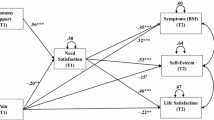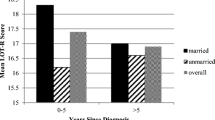Abstract
Background
Social support has been strongly linked to health outcomes. However, the factors associated with satisfaction with social support remain poorly understood.
Purpose
We examined the impact of different types of support, affect, marital satisfaction, personality, and disease-related variables on day-to-day and overall satisfaction with spouse responses.
Methods
Sixty-nine married people with rheumatoid arthritis completed an initial structured interview, followed by twice-daily phone interviews for 1 week.
Results
Higher levels of esteem support were associated with increased satisfaction, whereas negative spouse responses were related to decreased satisfaction across the day. Greater positive affect and lower pain were associated with higher concurrent satisfaction, but the effects did not last over the day. At the between-person level, older age and lower fatigue were related to higher satisfaction.
Conclusions
Several key factors related to support satisfaction were identified. Esteem support appeared to play a particularly important role and warrants attention in future research.
Similar content being viewed by others
References
Sarason IG, Sarason BR. Social support: Mapping the construct. J Soc Pers Relat. 2009; 26(1): 113-120. doi:10.1177/0265407509105526.
Kitamura T, Watanabe K, Takara N, Hiyama K, Yasumiya R, Fujihara S. Precedents of perceived social support: Personality, early life experiences and gender. Psychiatry Clin Neurosci. 2002; 56(2): 169-176. doi:10.1046/j.1440-1819.2002.00951.x.
Knoll N, Rieckmann N, Kienle R. The other way around: Does health predict perceived support? Anxiety Stress Coping. 2007; 20(1): 3-16. doi:10.1080/10615800601032823.
Haber MG, Cohen JL, Lucas T, Baltes BB. The relationship between self-reported received and perceived social support: A meta-analytic review. Am J Community Psychol. 2007; 39(1–2): 133-144. doi:10.1007/s10464-007-9100-9.
Kaul M, Lakey B. Where is the support in perceived support? The role of generic relationship satisfaction and enacted support in perceived support’s relation to low distress. J Soc Clin Psychol. 2003; 22(1): 59-78.
Sandler IN, Barrera M. Toward a multi-method approach to assessing the effects of social support. Am J Community Psychol. 1984; 12(1): 37-52.
Sarason IG, Sarason B, Searin EN. Social support as an individual difference variable: Its stability, origins, and relational aspects. J Pers Soc Psychol. 1986; 50(4): 845-855. doi:10.1037/0022-3514.50.4.845.
Hobfoll SE. Social support: The movie. J Soc Pers Relat. 2009; 26(1): 93-101. doi:10.1177/0265407509105524.
Kafetsios K, Nezlek JB. Emotion and support perceptions in everyday social interaction: Testing the “less is more” hypothesis in two cultures. J Soc Pers Relat. 2012; 29(2): 165-184. doi:10.1177/0265407511420194.
Uchino BN, Bowen K, Carlisle M, Birmingham W. Psychological pathways linking social support to health outcomes: A visit with the “ghosts” of research past, present, and future. Soc Sci Med. 2012; 74(7): 949-957. doi:10.1016/j.socscimed.2011.11.023.
Holtzman S, Delongis A. One day at a time: The impact of daily satisfaction with spouse responses on pain, negative affect and catastrophizing among individuals with rheumatoid arthritis. Pain. 2007; 131(1–2): 202-213. doi:10.1016/j.pain.2007.04.005.
Bolger N, Laurenceau JP. Intensive Longitudinal Methods: An Introduction to Diary and Experience Sampling Research. New York: Guilford Press; 2013: 2013.
Uchino BN. Understanding the links between social support and physical health: A life-span perspective with emphasis on the separability of perceived and received support. Perspect Psychol Sci. 2009; 4(3): 236-255. doi:10.1111/j.1745-6924.2009.01122.x.
Alamanos Y, Drosos A. Epidemiology of adult rheumatoid arthritis. Autoimmun Rev. 2005; 4(3): 130-136. doi:10.1016/j.autrev.2004.09.002.
Turk DC, Melzack R. The measurement of pain and the assessment of people experiencing pain. In: Turk DC, Melzack R, eds. Handbook of Pain Assessment. 3rd ed. New York, NY: The Guilford Press; 2011: 3-18.
Evers AW, Kraaimaat FW, Geenen R, Jacobs JW, Bijlsma JW. Pain coping and social support as predictors of long-term functional disability and pain in early rheumatoid arthritis. Behav Res Ther. 2003; 41(11): 1295-1310. doi:10.1016/S0005-7967(03)00036-6.
Cano A. Pain catastrophizing and social support in married individuals with chronic pain: The moderating role of pain duration. Pain. 2004; 110(3): 656-664. doi:10.1016/j.pain.2004.05.004.
Rook KS. Social support versus companionship: Effects on life stress, loneliness, and evaluations by others. J Pers Soc Psychol. 1987; 52(6): 1132-1147.
Beach SRH, Martin JK, Blum TC, Roman PM. Effects of marital and co-worker relationships on negative affect: Testing the central role of marriage. Am J Fam Ther. 1993; 21(4): 313-323.
Forgas JP, Bower GH, Krantz SE. The influence of mood on perceptions of social interactions. J Exp Soc Psychol. 1984; 20(6): 497-513. doi:10.1016/0022-1031(84)90040-4.
Forgas JP. Affect and the ‘social mind’: Affective influences on strategic interpersonal behaviors. In: Forgas JP, Williams KD, Wheeler L, eds. The Social Mind: Cognitive and Motivational Aspects of Interpersonal Behavior. Cambridge: Cambridge University Press; 2001: 46-71.
Nicholas MK, Coulston CM, Asghari A, Malhi GS. Depressive symptoms in patients with chronic pain. Med J Aust. 2009; 190(7 Suppl): S66-S70.
Lakey B, Cohen S. Social support theory and measurement. In: Underwood L, Gottlieb B, eds. Social Support Measurement and Intervention: A Guide for Health and Social Scientists. Oxford: Oxford University Press; 2000: 29-52.
Lehman AJ, Pratt DD, DeLongis A, et al. Do spouses know how much fatigue, pain, and physical limitation their partners with rheumatoid arthritis experience? Implications for social support. Arthritis Care Res. 2011; 63(1): 120-127. doi:10.1002/acr.20330.
Cutrona CE, Hessling R, Suhr JA. The influence of husband and wife personality on marital social support interactions. Pers Relat. 1997; 4: 379-393.
Swickert RJ, Rosentreter CJ, Hittner JB, Mushrush JE. Extraversion, social support processes, and stress. Personal Individ Differ. 2002; 32(5): 877-891. doi:10.1016/S0191-8869(01)00093-9.
Rascle N, Bruchon-Schweitzer M, Sarason I. Short form of Sarason’s social support questionnaire: French adaptation and validation. Psychol Rep. 2005; 97: 195-202.
Dehle C, Landers JE. You can’t always get what you want, but can you get what you need? Personality traits and social support in marriage. J Soc Clin Psychol. 2005; 24(7): 1051-1076. doi:10.1521/jscp.2005.24.7.1051.
Davis M, Affleck G, Zautra A. Daily interpersonal events in pain patients: Applying action theory to chronic illness. J Clin Psychol. 2006; 62(9): 1097-1113. doi:10.1002/jclp.
Courvoisier DS, Agoritsas T, Glauser J, et al. Pain as an important predictor of psychosocial health in patients with rheumatoid arthritis. Arthritis Care Res. 2012; 64(2): 190-196. doi:10.1002/acr.20652.
Karadag E, Kilic SP, Metin O. Relationship between fatigue and social support in hemodialysis patients. Nurs Health Sci. 2013; 15: 164-171. doi:10.1111/nhs.12008.
Motl RW, McAuley E, Snook EM, Gliottoni RC. Physical activity and quality of life in multiple sclerosis: Intermediary roles of disability, fatigue, mood, pain, self-efficacy and social support. Psychol Health Med. 2009; 14(1): 111-124. doi:10.1080/13548500802241902.
Bolger N, Davis A, Rafaeli E. Diary methods: Capturing life as it is lived. Annu Rev Psychol. 2003; 54: 579-616. doi:10.1146/annurev.psych.54.101601.145030.
Costa PT, McCrae RR. Normal personality assessment in clinical practice: The NEO personality inventory. Psychol Assess. 1992; 4(1): 5-13. doi:10.1037/1040-3590.4.1.5.
Whisman MA, Snyder DK, Beach SRH. Screening for marital and relationship discord. J Fam Psychol. 2009; 23(2): 247-254. doi:10.1037/a0014476.
Pincus T, Swearingen C, Wolfe F. Toward a multidimensional health assessment questionnaire (MDHAQ): Assessment of advanced activities of daily living and psychological status in the patient-friendly health assessment questionnaire format. Arthritis Rheum. 1999; 42(10): 2220-2230. doi:10.1002/1529-0131(199910)42:10<2220::AID-ANR26>3.0.CO;2-5.
Dworkin RH, Turk DC, Farrar JT, et al. Core outcome measures for chronic pain clinical trials: IMMPACT recommendations. Pain. 2005; 113(1–2): 9-19. doi:10.1016/j.pain.2004.09.012.
Derogatis LR. The Affects Balance Scale. Baltimore: Clinical Psychometric Research; 1975.
Derogatis LR, Rutigliano PJ. The Derogatis affects balance scale DABS. In: Spilker B, ed. Quality of Life and Pharmacoeconomics in Clinical Trials. 2nd ed. Philadelphia: Lippincott-Rave; 1996: 107-118.
Schulz U, Schwarzer R. Social support in coping with illness: The Berlin social support scales. Diagnostica. 2000; 49: 73-82.
McWilliams LA, Dick BD, Bailey K, Verrier MJ, Kowal J. A psychometric evaluation of the pain response preference questionnaire in a chronic pain patient sample. Health Psychol. 2012; 31(3): 343-351. doi:10.1037/a0027014.
Castro SL. Data analytic methods for the analysis of multilevel questions. Leadersh Q. 2002; 13(1): 69-93. doi:10.1016/S1048-9843(01)00105-9.
O’Connor BP. SPSS and SAS programs for addressing interdependence and basic levels-of-analysis issues in psychological data. Behav Res Methods Instrum Comput. 2004; 36(1): 17-28. doi:10.3758/BF03195546.
Hox JJ. Multilevel Analysis: Techniques and Applications. New Jersey: Lawrence Earlbaum Associates; 2002.
Raudenbush SW, Bryk AS. Hierarchical Linear Models: Applications and Data Analysis Methods. Thousand Oaks: Sage; 2002.
Kreft I, De Leeuw J. Introducing Multilevel Modeling. London: Sage; 1998.
van der Leeden R, Meijer E, Busing FMTA. Resampling multilevel models. In: de Leeuw J, Meijer E, eds. Handbook of Multilevel Analysis. New York: Springer; 2008: 401-434.
Feldman SI, Downey G, Schaffer-Neitz R. Pain, negative mood, and perceived support in chronic pain patients: A daily diary study of people with reflex sympathetic dystrophy syndrome. J Consult Clin Psychol. 1999; 67(5): 776-785.
Gremore TM, Baucom DH, Porter LS, Kirby JS, Atkins DC, Keefe FJ. Stress buffering effects of daily spousal support on women’s daily emotional and physical experiences in the context of breast cancer concerns. Health Psychol. 2011; 30(1): 20-30. doi:10.1037/a0021798.
Martire LM, Schulz R, Helgeson VS, Small BJ, Saghafi EM. Review and meta-analysis of couple-oriented interventions for chronic illness. Ann Behav Med. 2010; 40(3): 325-342.
DeLongis A, Capreol M, Holtzman S, O’Brien T, Campbell J. Social support and social strain among husbands and wives: A multilevel analysis. J Fam Psychol. 2004; 18(3): 470-479. doi:10.1037/0893-3200.18.3.470.
Lyubomirsky S, King L, Diener E. The benefits of frequent positive affect: Does happiness lead to success? Psychol Bull. 2005; 131(6): 803-855. doi:10.1037/0033-2909.131.6.803.
Schwarz N, Clore G. Mood, misattribution, and judgments of well-being: Informative and directive functions of affective states. J Pers Soc Psychol. 1983; 45(3): 513-523.
Smith CA, Wallston KA, Dwyer KA. On babies and bathwater: Disease impact and negative affectivity in the self-reports of persons with rheumatoid arthritis. Health Psychol. 1995; 14(1): 64-73.
Hagedoorn M, Dagan M, Puterman E, et al. Relationship satisfaction in couples confronted with colorectal cancer: The interplay of past and current spousal support. J Behav Med. 2011; 34(4): 288-297. doi:10.1007/s10865-010-9311-7.
Lakey B, McCabe KM, Fisicaro SA, Drew JB. Environmental and personal determinants of support perceptions: Three generalizability studies. J Pers Soc Psychol. 1996; 70(6): 1270-1280. doi:10.1037//0022-3514.70.6.1270.
Swickert RJ, Hittner JB, Foster A. Big five traits interact to predict perceived social support. Personal Individ Differ. 2010; 48(6): 736-741. doi:10.1016/j.paid.2010.01.018.
Iida M, Seidman G, Shrout PE, Fujita K, Bolger N. Modeling support provision in intimate relationships. J Pers Soc Psychol. 2008; 94(3): 460-478. doi:10.1037/0022-3514.94.3.460.
Taylor SE, Sherman DK, Kim HS, Jarcho J, Takagi K, Dunagan MS. Culture and social support: Who seeks it and why? J Pers Soc Psychol. 2004; 87(3): 354-362. doi:10.1037/0022-3514.87.3.354.
Holt-Lunstad J, Smith TB, Layton JB. Social relationships and mortality risk: A meta-analytic review. PLoS Med. 2010; 7(7): 1-20. doi:10.1371/journal.pmed.1000316.
Acknowledgments
The authors would like to express their gratitude to Drs. Esdaile and Chalmers and their colleagues at the Mary Pack Arthritis Center for their help in participant recruitment. The authors would also like to thank Drs. Cynthia Mathieson and Brian O’Connor for their feedback on a previous draft.
Funding
This research was supported by fellowships to the second author from the Canadian Institutes of Health Research and Michael Smith Foundation for Health Research, and grants to the third author from the Social Science and Humanities Research Council of Canada.
Authors’ Statement of Conflict of Interest and Adherence to Ethical Standards
Authors R. Thomas Beggs, Susan Holtzman, and Anita DeLongis declare that they have no conflict of interest. All procedures performed in studies involving human participants were in accordance with the ethical standards of the institutional and/or national research committee and with the 1964 Helsinki declaration and its later amendments or comparable ethical standards. Informed consent was obtained from all individual participants included in the study.
Author information
Authors and Affiliations
Corresponding author
About this article
Cite this article
Beggs, R.T., Holtzman, S. & DeLongis, A. Predicting Daily Satisfaction with Spouse Responses Among People with Rheumatoid Arthritis. ann. behav. med. 50, 24–33 (2016). https://doi.org/10.1007/s12160-015-9728-x
Published:
Issue Date:
DOI: https://doi.org/10.1007/s12160-015-9728-x




